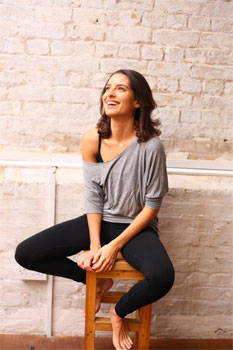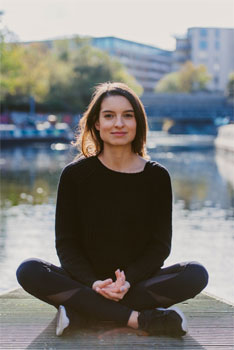Ashley Hunt Arthritis and Wellness Interview

Arthritis Affects Over 3.85 Million Australians
Arthritis affects over 3.85 million Australians, with this number set to increase to 7 million by 2050. Arthritis is not a singular disease, there are over 100 types of arthritis including osteoarthritis, rheumatoid arthritis and psoriatic arthritis, to name the most common. With so many different variations of arthritis, how is it possible to find -a one size fits all' remedy?
With limited efficacy for surgical intervention, painkillers have remained a key method to combat chronic back pain. Next year in February, a ban for over-the-counter (OTC) opioid painkillers has been legislated. This was put in place after a five-year-review on hospital admission to the misuse of OTC painkillers conducted by University of South Australia.
Yves Silveria, Musculoskeletal Physiotherapist professional says, 'Many people think that nothing can be done to relieve the symptoms, however this couldn't be further from the truth. There are many ways to reduce the effects of arthritis. It is essentially inflammation of the joint which leads to pain and restricted movement and there are ways to reduce these issues. Arthritis is more common than people think and it is not just limited to the elderly, 1 in 10 Australians suffer from this."
To reduce the impact of arthritis Yves shares his top five tips:
Heat and ice
Portable physio
Use rigid tape
Sleep and meditation
Exercise
For more information about PainPod visit www.thepainpod.com
 Interview with Ashley Hunt
Interview with Ashley Hunt
Question: When were you diagnosed with arthritis?
Ashley Hunt: My arthritis developed in February of 2016 and I was officially diagnosed in April 2016. I was 26 years old.
Question: Can you talk about the initial symptoms of your arthritis?
Ashley Hunt: One day my feet started to hurt. I thought I had spent too much time standing or wearing the wrong shoes. I didn't think much of it at first, but then a month went by and the pain hadn't gone away, in fact it got worse. The day the pain spread to my hands I knew something was wrong. Then, within three months it had spread to the rest of my body, mainly my ankles, knees, elbows, wrists and shoulders. All of a sudden I was barely able to do simple activities such as dress myself, prepare food and walk.
Question: How does arthritis affect you on a daily basis?
Ashley Hunt: Because my arthritis mainly affects my hands and feet it can be particularly debilitating. On days where the pain is bad I struggle to get out of bed. It affects my sleep as I find it hard to get comfortable, then it affects mostly every aspect of my day. It's difficult to shower, get dressed, make myself food, driving... Some days even typing and using my phone is difficult. It's a constant test of my resilience and strength.
Question: How do you treat your arthritis?
Ashley Hunt: I have a number of ways of treating my pain and ensuring that one day my arthritis is a thing of the past.
First and foremost, I meditate every day. I have been meditating since I was 15, but it wasn't until I got arthritis that I realised how important my practice was. It's what keeps me sane during the difficult times and it allows me to stay positive no matter how hard things get.
For times when I need instant pain relief, I use my Pain Pod. I try not to take pain killers, so discovering the pain pod has been a revelation to me. I often use it while I meditate, and it's so helpful if I know I'm going to have to do something physical. For example, if my friends have invited me on a hike, often I would have to cancel if my pain was bad. But the Pain Pod allows me to get my pain under control to be able to do physical activities that I couldn't before.
I am also very careful with what I eat as I find particular foods create inflammation and can lead to a flare up. I don't cut out any food groups completely, but I'm cautious of eating too much dairy, sugar or meat, especially if I'm flaring.
I also find hot yoga, acupuncture and infrared saunas helpful.
Question: Can you share with us what a typical day is like, for you?
Ashley Hunt: No two days are the same for me! As a meditation teacher my schedule changes all through the week. When I developed arthritis I was juggling a full time career as a PR/Marketing Manager with part time personal training on the side. I used to work myself very hard, thinking the day was wasted if I hadn't worked at least 10 hours. My priorities have shifted drastically over the past two years. Taking care of myself now comes first. And, surprisingly, since cutting back on my work hours and focusing only on what feels good/what's important to me, I'm happier and more fulfilled than ever before. I make sure each morning starts slow, with a cup of tea and a book or a nice long walk. I try not to look at my phone for the first hour of the day. I then work from home or go off to teach a class. I teach around 3 classes a day, public or corporate, and when I'm not teaching I'm running my online course, coaching clients one-on-one or planning my Bali retreat. I meditate once or twice a day and usually take a nap most afternoons.
Question: How does wellness and meditation help your arthritis?
Ashley Hunt: Once I realised how much my meditation had helped me overcome the difficulty of living with arthritis, I knew I had to share my knowledge with others. Many people struggle to cope with the challenges they face, simply because they don't have the right tools. I now help people better endure their hardships using meditation and mindfulness. From other sufferers of chronic pain, to people experiencing stress or anxiety, or anyone going through a hard time or feeling a little lost. The perspective that we gain from mindfulness results in clarity. Once we remove the fog from the emotional response to a situation, we are able to make a rational and carefully considered plan of action on how to proceed. At first it was a hard pill to swallow when I had to give up personal training as I was no longer able to exercise myself, but I realised that it wasn't the actual movement that I liked. It was encouraging people to take time out of their day to focus on themselves and their health. It was helping them restore balance between their mind and body, to reset and unwind When I became a meditation teacher, everything started to make sense. I realised I was able to help people in a similar way, that actually suited my personality much better. I'm a much better meditation teacher than I ever was personal trainer!
Question: Do you still work out, regularly?
Ashley Hunt: At first, I was unable to exercise at all. Now I exercise regularly, but my workout routine has changed a lot. I used to be obsessed with aerial arts and gymnastics type movements. I would hang upside down on all sorts of different apparatus, or balance in a one-handed handstand. While I can't do any of those things anymore, I have learnt to love and respect my body in a different way. I move my body every day, with functional, joint-loving movements that help keen me mobile. I've slowed things right down and instead of pushing myself to my physical limits, I focus on exercise that feels good. Yin yoga is a favourite on a Sunday afternoon!
 Question: What advice do you have for others recently diagnosed with arthritis?
Question: What advice do you have for others recently diagnosed with arthritis? Ashley Hunt: Let yourself rest. Your life doesn't need to go back to the way it was before. Let it evolve and stop putting pressure on yourself to get better. You'll have ups and downs. Listen to your body. If you need to spend a day in bed, do that. If you need to go home from work early, that's fine too. Take care of yourself and save your energy. Trust me, resting can be pretty f*cking awesome! It's OK to have a bad day.
Connect with others who have arthritis. It was extremely isolating feeling like I was the only young person who was going through what I was going through. The most valuable thing for me since being diagnosed has been to connect with other young sufferers, to know that I am not alone. There is unique solace to be found in someone else who also has difficulty pouring a cup of tea and who fully understands my fear of being locked in a public bathroom as my hands struggle with locks and handles. Other people offer sympathies, but it's hard for them to really understand what it's like.
Learn to meditate. It's free, you can do it anywhere and it will change your life. Even if things aren't that bad, meditation is a way of working on your well-being at the best of times so that when challenges come along, you have tools to help you re-gain control.
Pain medication is helpful and can sometimes be necessary, but there are other ways too. Explore alternative therapies such as acupuncture, infrared saunas, and get yourself Pain Pod.
MORE



